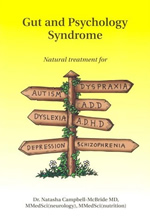The Body Chemist - Nutritional Therapy
Gut and Brain - is it connected?
When I brought this theory to the attention of my son's consultant he suggested that I may have been reading the internet and had "jumped on a gluten free fad ". This attitude made me angry, as a scientist I hadn't been visiting any old site, my research was thorough and backed by experts in nutrition. One of the books I had read and would recommend if your child has any autistic spectrum disorder is a book by Dr. Natasha Campbell McBride called Gut and Psychology Syndrome; Natural Treatment of Autism, ADHD, Dyslexia, Depression and Schizophrenia. Her work inspired me to research further into gut flora which is an emerging and fascinating area. Its role in our health and in its ability to maintain our gut integrity made me look at my son's issues in a whole new light. He had had many courses of antibiotics and I had suffered from recurrent thrush. It was suddenly so clear what he needed, and it worked. I believe a healthy gut and its flora has a massive part to play in our brain health and our overall health. The Gut is very much connected to the brain.
Dr Campbell-McBride

Dr. Campbell-McBride developed her theories on the relationship between neurological problems and diet. Having treated her son of the autistic spectrum, Dr. Campbell-McBride returned to practice in 2000 and now runs the Cambridge Nutrition Clinic. She specializes in using nutritional approach as a treatment, and has become recognized as one of the world's leading experts in treating children and adults with learning disabilities and other mental disorders, as well as children and adults with digestive and immune disorders. She discovered patients with learning disabilities also had serious physiological maladies, often auto-immune related. According to her theory, all disease begins in the gut. Gut flora, especially, plays a key role in human health and it's a subject that until recently has been virtually ignored by most mainstream medical professionals. Our gut flora is precious! It protects us from pathogens, aids in digestion, assimilation and absorption, modulates the immune system and aids in detoxification. Our gut flora can become compromised by many things including antibiotics and other drugs, toxins, chlorine in the water supply, illness, pollution, radiation, stress, age, and others.
Problems with gut health can begin with the infant in-utero. The mother's gut flora is often compromised because of the factors noted above, so healthy flora are not passed on to the fetus. After birth, the typical infant problems of infections, antibiotics, over vaccination, poor food-weaning and other issues can arise and the road to poor health begins. As the child develops, the lack of beneficial flora can lead to a damaged and more permeable gut wall that cascades into malabsorption, food allergies toxicity, immune system decline and possibly auto immune disorders. Dr. Campbell-McBride went on to explain how toxic by-products affect other parts of the body like the liver and the lung; leading to allergies, asthma and even long term lung damage. The body tries to eliminate toxins through the lung, skin, urinary tract and mucus membranes. If these detox pathways are compromised, asthma, eczema, chronic cystitis, chronic sinusitis, frequent colds, diarrhea, constipation, and irritable bowel will likely follow. The absorption of protein and toxins through the damaged gut wall can pollute the blood as it crosses the blood-brain barrier. This can subsequently lead to depression, learning disorders, substance abuse, and a host of psychological issues. This is how we arrive at the link between gut and psychology.You can read more about Dr. Campbell-McBride and the GAPS diet at www.GAPSdiet.com
Problems with gut health can begin with the infant in-utero. The mother's gut flora is often compromised because of the factors noted above, so healthy flora are not passed on to the fetus. After birth, the typical infant problems of infections, antibiotics, over vaccination, poor food-weaning and other issues can arise and the road to poor health begins. As the child develops, the lack of beneficial flora can lead to a damaged and more permeable gut wall that cascades into malabsorption, food allergies toxicity, immune system decline and possibly auto immune disorders. Dr. Campbell-McBride went on to explain how toxic by-products affect other parts of the body like the liver and the lung; leading to allergies, asthma and even long term lung damage. The body tries to eliminate toxins through the lung, skin, urinary tract and mucus membranes. If these detox pathways are compromised, asthma, eczema, chronic cystitis, chronic sinusitis, frequent colds, diarrhea, constipation, and irritable bowel will likely follow. The absorption of protein and toxins through the damaged gut wall can pollute the blood as it crosses the blood-brain barrier. This can subsequently lead to depression, learning disorders, substance abuse, and a host of psychological issues. This is how we arrive at the link between gut and psychology.You can read more about Dr. Campbell-McBride and the GAPS diet at www.GAPSdiet.com
Go to The Body Chemist
for Nutritional Therapy
